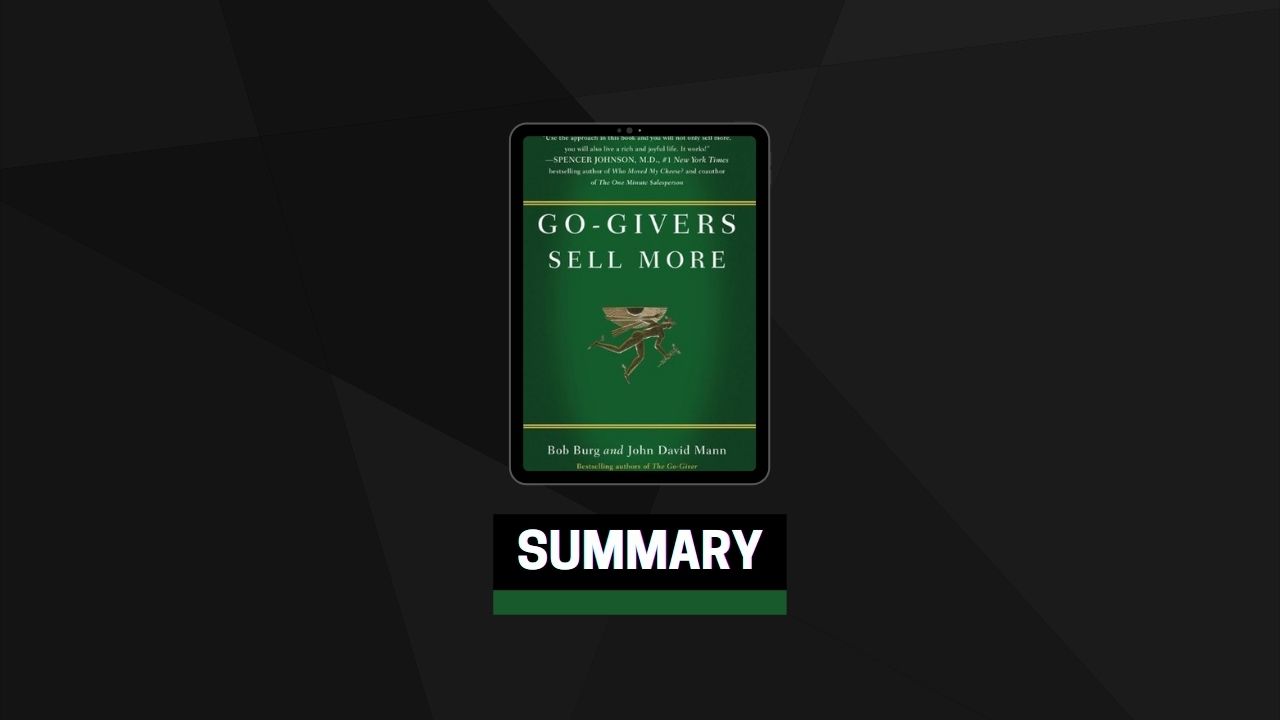Create Value
Your job is not to make a sale but to create something else: value. In fact, as a salesperson you can define your job description in three words: I create value.
Value is the relative worth or desirability of a thing to the user or beholder. It is those qualities or characteristics in a thing or experience that give it worth, importance, or preciousness—especially as compared to its cost, whether in dollars or other terms.
Four-fifths of selling is creating value. The final one-fifth involves the sale itself; however, even when the sale happens, you don’t make that sale—you receive it.
Giving
To be successful in sales, it’s important to understand how giving actually works.
The essence of the Go-Giver philosophy is this: the more you give, the more you have.
Managing a relationship with a scorecard doesn’t work because nobody can ever measure up to the subjectivity of another’s billiard-ball calculations. Millions of marriages have broken up over scorecards that didn’t seem (to either party) to tally fairly. Millions of citizens have been conscripted to bear arms in the effort to square warring states’ grudge- and-privilege balance sheets. Live by billiard- ball logic, and before long bullets will fly.
Relationships don’t work this way because they are governed by an altogether different physics.
In the economics of human interaction, spending doesn’t deplete, it multiplies. The more knowledge you give, the more you have. The same with appreciation, acknowledgment, wisdom, attention, care. When you keep it to yourself it doesn’t build interest; it withers. In fact, the only way you can get more of it is to continuously give it away.
If that sounds familiar, it should: that’s not only how giving works, it’s also how love works. That is the economics of all genuine relationships, and therefore, the dynamic that lies at the heart of sales.
Money
Money is an echo of value. It is the thunder to value’s lightning. Create value, and money follows—it has to. But it’s crucial to keep money in its right perspective. As Ernesto puts it, “Does it make money?” is not a bad question; in fact, it’s a great question. It’s just a bad first question.
“The first question,” Ernesto adds, “should be, ‘Does it serve?’ or ‘Does it add value to others?’ If the answer to that question is yes, then you can go ahead and ask, ‘Does it make money?’”
If putting money first doesn’t work, neither does denying money or pretending it doesn’t exist.
The Paradox
We do something similar every time we watch a good film. We know it’s just a movie; we know that James Bond isn’t really blowing up an entire terrorist’s compound, and that when the lead terrorist points a gun at Bond’s head and he responds by coolly cracking a joke, the actor’s life isn’t actually in danger. But in order to enjoy the story, we willingly suspend our disbelief.
When we step into the theater, we make believe that what’s up on the screen is really happening so that we can experience the thrill, the fear, the suspense and resolution, the full emotional intensity of the situation, and then bring our sense of catharsis with us out of the theater. We still know it isn’t real. But by temporarily setting that understanding to the side, we gain emotional access to the entire experience, and even after the film is over and we allow our disbelief to return, we continue to enjoy the effect of that experience.
This is exactly what we do in sales: we willingly suspend our self-interest. We don’t erase or deny it; we simply set it aside for a moment so we can gain emotional access to the full experience of the Law of Value.
Build Networks
The nature of genuine influence is often misunderstood. We often think of influence as the ability to get other people to do what we want them to. But genuine influence accrues to those who become known as the sort of person who is committed to helping other people get what they want.
Genuine influence flows from reputation. When you set out to create a career in sales, your single most important task is the building of reputation. Financial capital, savings, company position or rank in an organization, business assets—all these can be gained and lost and gained again. All are inconsequential in comparison to reputation, which is a house that, once burned down, is very difficult to rebuild.
Great salespeople grow great networks because they focus their actions on looking out for the other person’s interests and serving their needs. They prefer to give the credit away than to seek it for themselves. Rather than aspire to be kings, they seek to be kingmakers. They are constantly on the lookout for ways they can help to elevate other people’s lives—and in the process they become enormously influential themselves.
The Perfect “Pitch”
The part of selling that most aspiring salespeople have the hardest time with is prospecting. This is simply because we’re all people, and most of us want to be liked by other people. Knocking on doors and making sales calls doesn’t seem like a great way to do that. People don’t like being prospected, and we all know it. It’s no wonder we dread the prospect of prospecting.
If you’re going to be great at selling, you need to find a way to go about it that feels a lot more comfortable, both for you and for the other person. And that comes down to the question of the pitch.
The secret to the perfect sales pitch is to have no pitch.
Great salespeople turn the three- foot rule on its head by making it about the other person. The Go-Giver salesperson’s three-foot rule goes something like this:
Anyone within three feet is worth getting to know better.
That said, when you’re at an event with a lot of people, don’t feel you need to meet everyone. Your aim is to have fun and make friends. Go for quality, not quantity. And don’t pitch.
“But if I don’t pitch, then what do I do?”
Great question. And that’s exactly what you do: ask great questions—which is what we’ll look at next.
Great Questions
What do you see as most unique or special about your company or your business?
What advice would you give someone just starting out in the [fill in the blank] business?
What’s the strangest or funniest thing you’ve seen happen in your business?
What significant changes have you seen in your profession in, say, the past ten years?
What do you see as the coming trends in the [fill in the blank] business?
To truly experience the power of these questions, take a moment to go through them yourself, one by one, imagining that someone is asking them of you. As you answer, be aware of how you feel. You’ll begin to get a tangible sense of the kind of value a great question can create for another person. It can allow them to offer their expert opinion, brag a bit about their strengths, muse on those aspects of their business that intrigue them, please them, fascinate them, and gratify them most. It turns the flashlight of their attention on what’s great about their life.
There is nothing slick or clever about these questions, no special wording you have to get just right. At their essence, they come from your being genuinely curious about the person’s life. And by the way, you will likely never ask them all in one conversation. Often two or three will do fine.
Follow-Through
Sales trainings usually use the term follow-up, which means continuing or repeating something that has already been done. We like the term follow-through even better, since it means completing a process or action and taking it to its fullest conclusion.
The essence of follow-through is this: in the hours, days, and weeks after meeting and talking with your new acquaintance, continue looking for ways to add value to their life. For example, you can send a personalized, handwritten thank-you note that says what a pleasure it was to meet them. It’s such a simple thing, and it speaks volumes.
One of the greatest ways of creating value for people is by connecting them to other people and suggesting ways they can do business with each other or benefit in some other way from the relationship. In this way, you serve as a catalyst for others’ greatness. The cost? Nothing. The value? Incalculable.
Your Serve
People are not looking for features, or what something is; they are looking for benefits, or what it can do for them. The most helpful answer to the question “So, what do you do?” is one that explains what you have to offer in such a way that the other person immediately grasps the benefits of what your product or service will do for them (or for others they know).
A pitch is me-focused. A serve is them-focused.
Your serve is your brief answer to the question “What do you do?” that describes the benefits people derive from doing business with you.
This is worth investing some time to explore. Take a piece of paper and brainstorm the benefits of your business and the product or service you sell. As you do this, you’ll get the best results if, instead of asking the question, “What is it I’m selling?” you ask the question, “Why would people want to buy from me—what benefits would that give them?”
Features are answers to the question “What?”
Benefits are answers to the question “Why?”
The Competition
Whenever you’re speaking to a prospect and they bring up your competitor, go out of your way to say something nice about him or her. Because you’re a nice person? No. (Although we’re sure you are indeed a very nice person). Because when you compliment your competitor, you are also demonstrating respect—and respect earns respect.
If in a conversation you tear down your competitor, it actually diminishes you in the other person’s eyes. On the other hand, when you take care to say something positive about your competition, it actually builds you up in their eyes. These are the messages that register for the other person, consciously or not:
You are confident. Knocking the competition is one way people often try to act confident. Ironically, it telegraphs precisely the opposite message. But if you not only refrain from speaking ill of your competitors but actually speak highly of them, then you must be genuinely confident. And confidence breeds confidence.
You are successful. If you are genuinely confident, then it stands to reason you must also be successful. After all, unsuccessful people don’t have that sort of genuine confidence in themselves.
You are safe. If you speak that highly of your competition, then this person knows they’ll never have to worry about what you say about them behind their back.


